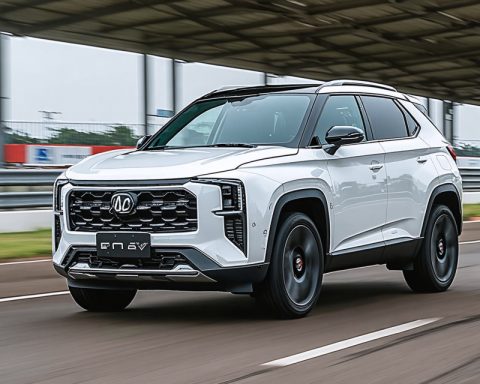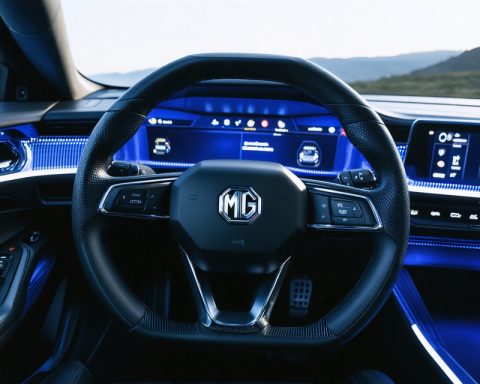- Porsche launches a pilot project for sustainable EV battery recycling, using advanced technology to recover vital raw materials.
- The process transforms spent batteries into ‘black mass,’ rich in nickel, cobalt, manganese, and lithium, which are essential for new batteries.
- About 65 tonnes of raw granulate have been produced from developmental vehicle batteries so far.
- Porsche aims to extract high-purity elements from ‘black mass’ to meet quality standards for new EV batteries.
- The initiative promises a closed-loop method, reducing environmental impact and securing the raw material supply chain.
- Porsche’s program anticipates upcoming EU regulations, showcasing its commitment to sustainable innovation and luxury coexistence.
- The project exemplifies a shift toward a circular economy, aligning luxury with environmental responsibility.
Porsche is shifting gears with a groundbreaking pilot project aimed at revolutionizing how electric vehicle (EV) batteries are recycled, emphasizing a sustainable future that hinges on the meticulous recovery of vital raw materials. This initiative sets a new standard for the automotive industry, juxtaposing cutting-edge technology with environmental stewardship.
Imagine a tsunami of spent electric vehicle batteries cascading across industries—a daunting scenario for many, but for Porsche, it is an opportunity to innovate. The luxury carmaker has embarked on a mission to transform these discarded energy cells into a treasure trove of essential elements. By leveraging mechanical shredding, old batteries morph into ‘black mass’—a raw material rich in nickel, cobalt, manganese, and lithium. These are the very elements that breathe life into new batteries and enhance their performance.
So far, this audacious project has yielded about 65 tonnes of raw granulate from the remains of developmental vehicle batteries. But this is just the beginning. Porsche envisions a full-circle transformation, where even ‘black mass’ undergoes further refinement. Here, the precision of science meets the art of innovation, as high-purity elements are meticulously extracted, meeting Porsche’s stringent quality standards and ensuring that every new EV battery embodies excellence.
The ultimate goal is not just about recycling but redefining. In the near future, Porsche plans to produce battery cells that are partially composed of this recycled content, ready to be tested in upcoming vehicle models. This closed-loop method doesn’t just curb environmental impacts—it also secures a stable supply chain in the face of geopolitical uncertainties around raw materials.
This initiative aligns with the anticipation of stringent EU battery regulations set to roll out by 2031, which will require higher levels of recycled content and greater traceability. Yet, Porsche’s early adoption speaks volumes about its commitment to sustainable innovation.
As the world watches, Porsche demonstrates that luxury and responsibility are no longer mutually exclusive. The road ahead is clear: a circular economy, where waste becomes resource and sustainability drives innovation. This project not only underpins Porsche’s strategic foresight but sets the pace for an industry steadily racing towards a greener horizon.
Porsche’s Eco-Revolution: How Their EV Battery Recycling Project Sets a New Industry Standard
Porsche’s innovative approach to electric vehicle (EV) battery recycling is setting a new benchmark in the automotive industry, focusing on sustainability and technological advancement. This pilot project, which emphasizes the recovery and reuse of vital raw materials, marks an ambitious step towards a circular economy in the automotive sector. Here’s an in-depth exploration of this groundbreaking initiative, along with insights and practical advice for businesses and consumers alike.
The Core of Porsche’s Battery Recycling Initiative
Porsche’s project not only focuses on recycling but innovates the process by transforming spent batteries into ‘black mass’—a rich material comprising essential elements like nickel, cobalt, manganese, and lithium. These materials are integral to producing new and more efficient batteries.
1. Mechanical Shredding Process: This technique breaks down old batteries into raw granulate. Porsche has already processed about 65 tonnes of this material, setting a precedent for future scalability.
2. Closed-Loop System: By re-integrating these recycled materials into new batteries, Porsche aims to decrease dependency on virgin resources, ensuring supply chain stability amidst geopolitical tensions.
Exploring the Wide-Ranging Impact
– Economic Advantages: Utilizing recycled materials can potentially reduce production costs, a benefit that can be passed on to consumers, fostering broader adoption of EVs.
– Environmental Benefits: This initiative significantly lowers the carbon footprint associated with battery production, contributing to global climate goals.
How-To Steps for Sustainable Battery Recycling
1. Develop Efficient Collection Systems: Establish Return-to-Base (RTB) programs where consumers can easily return used batteries.
2. Enhance Shredding Technology: Invest in cutting-edge mechanical shredding technology to efficiently process batteries into black mass.
3. Refinement Processes: Implement chemical refinement techniques to extract high-purity materials for reuse.
Challenges and Limitations
– Technological Barriers: Developing efficient technologies for the extraction and refinement of black mass poses significant challenges.
– Regulatory Compliance: Adhering to upcoming regulations, especially in the EU, will require ongoing innovation and investment.
Real-World Use Cases and Industry Trends
– Rise of Circular Economy: Many companies are now exploring ways to integrate recycled materials into their production processes, reducing wastage.
– Trend Toward Sustainability: As regulatory pressure mounts, more automakers will likely adopt similar initiatives to stay competitive.
Expert Insights and Predictions
– Market Shift: There’s an anticipated shift towards greater use of recycled materials across industries, driven by consumer demand for sustainable products.
– Future Prospects: As technology evolves, the efficiency and cost-effectiveness of these recycling processes are expected to improve, further solidifying their place in manufacturing.
Actionable Recommendations
– Automakers: Begin investing in recycling technologies and partner with tech companies to co-develop solutions.
– Consumers: Support brands that prioritize sustainability by purchasing products with recycled content.
Visit Porsche’s Website
For more on Porsche’s commitment to innovation and sustainability, visit the official Porsche website.
By adopting and expanding upon Porsche’s model, the automotive industry can move toward a more sustainable and economically viable future. With careful innovation, rigorous quality controls, and a commitment to environmental stewardship, the dream of a circular economy is increasingly within reach.




















